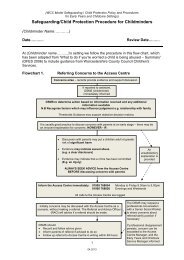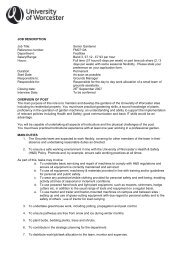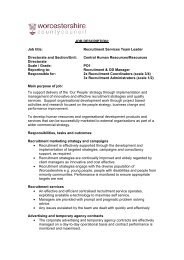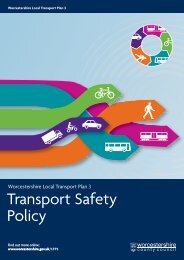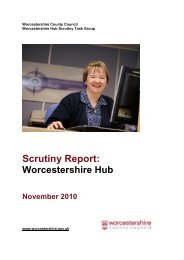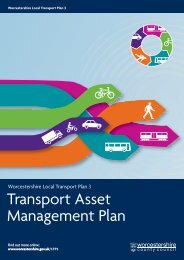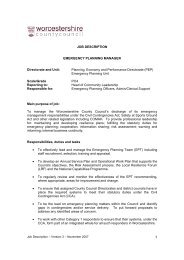Planning for Renewable Energy in Worcestershire Research Paper
Planning for Renewable Energy in Worcestershire Research Paper
Planning for Renewable Energy in Worcestershire Research Paper
You also want an ePaper? Increase the reach of your titles
YUMPU automatically turns print PDFs into web optimized ePapers that Google loves.
11. Technological Issues <strong>for</strong> <strong>Renewable</strong> <strong>Energy</strong><strong>in</strong> <strong>Worcestershire</strong>11.1 When consider<strong>in</strong>g the type ofrenewable generation technology whichmay be most appropriate <strong>in</strong> a givenlocation, there are many factors whichmust be taken <strong>in</strong>to account, <strong>in</strong>clud<strong>in</strong>g thepolicy and community issues referred toelsewhere <strong>in</strong> this paper. A technologicalassessment of renewables is alsorequired <strong>in</strong> order to understand what willor will not make an effective contributionto reduc<strong>in</strong>g emissions. A more detaileddescription of each technology is providedat Appendices A and B.11.2 It is worth not<strong>in</strong>g that CO2emissions result<strong>in</strong>g from electricity areconsiderably higher than those from gasor oil. For example, <strong>for</strong> a typical domesticheat<strong>in</strong>g system, CO2 emissions arecalculated as: 0.27 kg/kWh <strong>for</strong> oil; 0.194kg/kWh <strong>for</strong> gas; and 0.46 kg/kWh <strong>for</strong>electricity 28 . This is because the electricityused <strong>in</strong> the home or workplace must begenerated (usually off-site and from fossilfuels), and this results <strong>in</strong> significant CO2emissions. It is thus more efficient (<strong>in</strong>emissions terms) to heat water us<strong>in</strong>g gasthan it is to heat it with electricity. Thismeans that more renewable energy isrequired to offset electrical usage thangas. The Department of Trade andIndustry give the follow<strong>in</strong>g example toshow the relative benefits of each:4m2 solar water heat<strong>in</strong>g offsets1,600kWh gas;20m2 photovoltaics offsets1,600kWh electricity11.4 The greatest reduction <strong>in</strong> CO2 willbe achieved through a holistic approach,whereby energy is considered <strong>in</strong> all its<strong>for</strong>ms and across all sectors. As stated <strong>in</strong>the <strong>in</strong>troduction, this paper is concernedprimarily with energy generation ratherthan conservation. However, it isimportant to recognise the range ofexist<strong>in</strong>g built stock, and to appreciate thatretro-fitt<strong>in</strong>g renewables and mak<strong>in</strong>g exist<strong>in</strong>ghomes and bus<strong>in</strong>esses more energyefficient could yield massive emissionssav<strong>in</strong>gs. It is stated <strong>in</strong> the Government'sconsultation 'Build<strong>in</strong>g a Greener Future:Towards Zero Carbon Development', that"…by 2050 as much as one third of thetotal hous<strong>in</strong>g stock will have been builtbetween then and now." This illustratesnot only the scale of the challenge to<strong>in</strong>fluence that third of all hous<strong>in</strong>g that is tobe built, but also the two-thirds of exist<strong>in</strong>ghous<strong>in</strong>g that could be upgraded.28Figures taken from the University of Strathclyde's<strong>Energy</strong> Systems <strong>Research</strong> Unit. In<strong>for</strong>mation availableat: http://www.esru.strath.ac.uk/EandE/Web_sites/01-02/heat_pump/auxiliary.html#top411. TECHNOLOGICAL ISSUES ● <strong>Plann<strong>in</strong>g</strong> <strong>for</strong> <strong>Renewable</strong> <strong>Energy</strong> <strong>in</strong> <strong>Worcestershire</strong>Technical <strong>Research</strong> <strong>Paper</strong> 27




